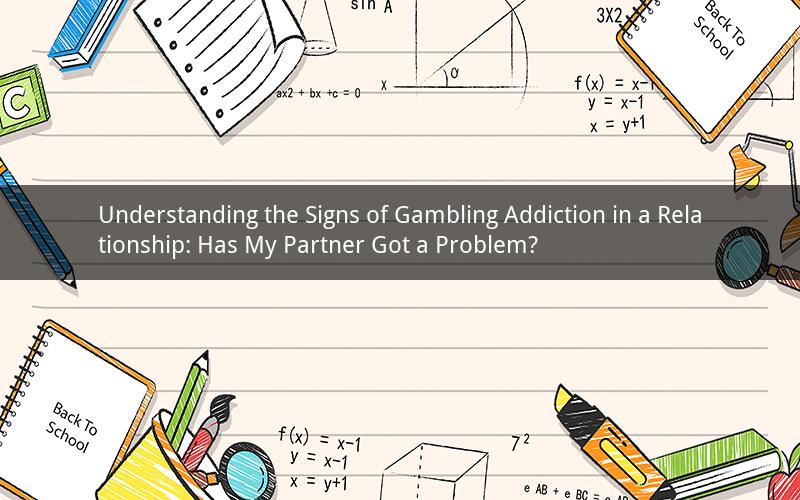
Introduction:
Gambling addiction, also known as compulsive gambling, can be a challenging and secretive issue that affects individuals and their relationships. Recognizing the signs of gambling addiction is crucial in order to provide support and assistance to the affected partner. In this article, we will delve into the common indicators of gambling addiction and explore how to determine if your partner may be struggling with this problem.
1. Unexplained Financial Struggles:
One of the most telling signs of gambling addiction is the unexplained financial difficulties experienced by the individual. If your partner has been secretive about their spending habits or has suddenly started accumulating debt, it could be a red flag. Uncontrolled gambling can lead to significant financial losses, causing stress and strain on the relationship.
2. Secretive Behavior:
Gambling addicts often exhibit secretive behavior to hide their problem from loved ones. Pay attention to any sudden changes in your partner's behavior, such as avoiding eye contact, lying about their whereabouts, or becoming increasingly secretive about their finances. This behavior may indicate that they are trying to conceal their gambling activities.
3. Emotional and Behavioral Changes:
A person struggling with gambling addiction may experience a range of emotional and behavioral changes. Look out for signs such as mood swings, irritability, increased stress, and a lack of interest in previously enjoyed activities. They may also become more argumentative and defensive when confronted about their behavior.
4. Time and Energy Shifts:
Gambling addiction can consume a significant amount of time and energy. If you notice that your partner is spending an excessive amount of time at the casino, online gambling sites, or with friends who engage in gambling, it may be a cause for concern. They may also neglect their responsibilities at home, work, or school due to their gambling addiction.
5. Denial and Minimization:
One of the hallmark characteristics of gambling addiction is denial. Your partner may deny having a problem or downplay the severity of their addiction. They may claim that they can control their gambling habits or that they are only gambling for fun. Be cautious of these excuses and recognize that they are part of the addiction's denial process.
6. Borrowing Money or Selling Belongings:
Gambling addicts often turn to desperate measures to fund their addiction. They may start borrowing money from friends, family, or even taking out loans to support their gambling habit. In some cases, they may sell personal belongings or commit illegal activities to acquire funds for gambling.
7. Relationship Strain:
The presence of a gambling addiction can put a significant strain on a relationship. Your partner may become distant, moody, or emotionally unavailable. Arguments may arise due to financial issues, mistrust, or feelings of betrayal. Recognizing these relationship problems can be a critical indicator of a gambling addiction.
8. Physical Health Issues:
Gambling addiction can also lead to physical health problems. Your partner may experience sleep disturbances, fatigue, weight loss or gain, and other symptoms resulting from stress and anxiety caused by their addiction.
Conclusion:
Identifying the signs of gambling addiction in a relationship can be challenging, but it is essential for the well-being of both individuals involved. By being aware of the common indicators such as unexplained financial struggles, secretive behavior, emotional and behavioral changes, time and energy shifts, denial, borrowing money, relationship strain, and physical health issues, you can better understand if your partner may be struggling with a gambling problem.
Questions and Answers:
Q1: What should I do if I suspect my partner has a gambling problem?
A1: If you suspect your partner has a gambling problem, it is crucial to approach the situation with empathy and support. Encourage them to seek professional help, such as therapy or a support group, and offer your assistance in their recovery journey.
Q2: How can I support my partner during their recovery from gambling addiction?
A2: Support your partner by being patient, understanding, and non-judgmental. Encourage them to seek professional help, provide emotional support, and help them develop healthier habits and coping mechanisms. It is also important to take care of your own mental and emotional well-being during this challenging time.
Q3: Can gambling addiction be cured?
A3: While there is no definitive cure for gambling addiction, it is a treatable condition. With proper treatment, support, and a strong commitment to recovery, individuals can overcome their addiction and lead healthier lives.
Q4: Is it my fault that my partner has a gambling problem?
A4: No, it is not your fault if your partner has a gambling problem. Addiction is a complex issue that affects the individual struggling with it. Blaming yourself or others will not help the situation and may hinder your partner's recovery.
Q5: How can I protect myself from the negative consequences of my partner's gambling addiction?
A5: To protect yourself from the negative consequences of your partner's gambling addiction, establish boundaries and prioritize your own well-being. Seek support from friends, family, or support groups, and consider legal or financial advice to safeguard your own interests. Remember, your partner's addiction is their responsibility, and it is important to focus on your own health and happiness.